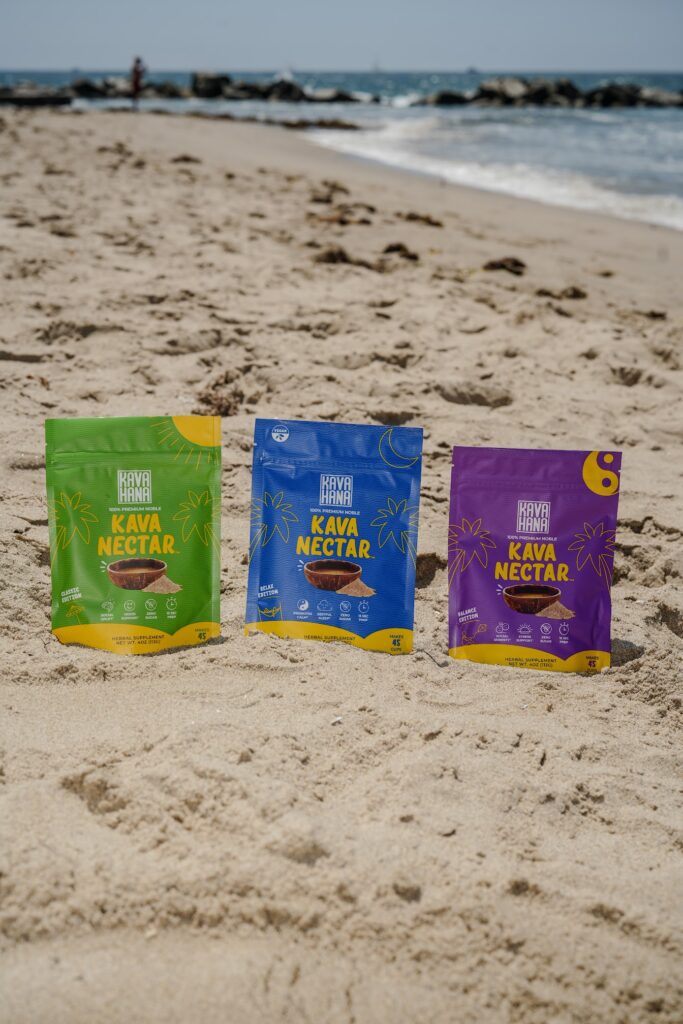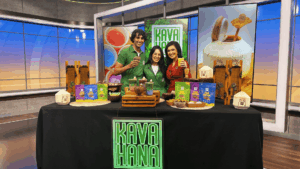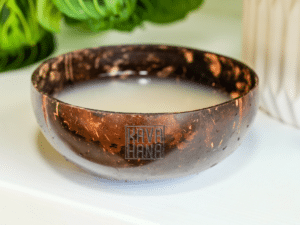Kava is an earthy drink made from the root of the pepper plant Piper methysticum, native to the Pacific Islands. It’s been used for over 3000 years for its unique ability to boost feelings of sociability and connection with others and for its health benefits, such as reducing anxiety and helping with sleep disorders. There two ways to make it; the time intensive traditional kava, or the instant way, like Kava Nectar.
To make kava powder, the essence of kava tea, the plant’s roots are harvested, dried, and ground into a fine powder. Historically, the process of making the tea involved chewing the root to break it down, but we now have other ways to break kava down to simplify the preparation.
Kava is available in four common forms:
- Traditional Grind
- Instant Kava
- Micronized Kava
- Kava Extracts and supplements
Generally, we’re not huge fans of micronized kava and kava extracts. Micronized kava is similar to instant kava but isn’t as finely ground. While it’s meant to dissolve easily in water, the problem is that there will always be a bit of residue and texture from the kava itself, no matter how much it’s ground down. Kava root is very tough and difficult to digest, so this form of kava can cause upset stomachs in some people more than others. As for kava extracts and supplements, these are highly processed forms of kava that often include additional ingredients and unwanted additives. These can impact how kava is absorbed and may have negative side effects.
Traditional and instant kavas are the most authentic and original ways to enjoy the benefits of kava. Here, we break down the differences in the benefits and make traditional kava and our Kava Nectar.
Traditional kava
Traditional kava is made through a time-intensive, multi-step process. It starts with dried kava root powder. The amount used will depend on the type of kava being used and the experience you want to have; the more kava used, the stronger the experience.
The powder is then added to a fine woven bag, like a tea bag, to be steeped in warm water. The bag and powder are steeped and then massaged for several minutes to release the kavalactones, the active ingredients, and other health benefits. You’ll know you’ve successfully steeped the kava into tea, when the water turns an earthy brown color. This is how kava is prepared in the Pacific Islands, and it has been for centuries. It gives preparers a closer cultural experience that often goes hand-in-hand with drinking kava.
Here is how you can make your traditional kava. First, gather your ingredients and tools. You need:
- A fine woven bag to strain kava root (e.g. Mesculin bag is recommended)
- High-grade kava root
- Warm water
- Bowl to mix kava (medium to large is best)
- Small cups to drink from
- Kitchen scale (for measuring dose)
Next, the instructions:
- Measure kava dose. The recommendation is about 10grams (0.4 oz) of high-quality powdered kava
- Put kava in a strainer bag, tie it off, and place it in the bowl
- Add water (cold or lukewarm – NOT hot) and let sit for 3-5 minutes.
- Mash! Here is where you want to massage or knead the bag. This helps get all the goodness out into the water. It should look muddy brown now. Do this for about 10 minutes.
- Strain! Strain the kava by squeezing all the liquid from the bag. (You can get up to 3 steeps with one bag, so don’t throw this away!)
- Pour in your cup and Enjoy!
Kava Nectar
On the other hand, we have instant kava. Some will argue that instant kava isn’t “real kava,” but the truth is that it’s just a form of kava that is easier and faster to prepare. It’s a great option for those looking to try kava for the first time or for kava lovers who are short on time.
In general, instant kava can be made by preparing traditional kava and dehydrating it. It can also be extracted from dehydrated green kava roots. This is often referred to as a Toss-and-Wash preparation.
In our case, Kava Nectar is made from the dried juice of the kava roots. It has no additional ingredients, such as added sugar, fillers, preservatives, or artificial flavors.
To make Kava Nectar, put a teaspoon of powder in your shell or cup and then add room-temperature or lukewarm water or your favorite beverage. Mix it well; we like to use a Japanese bamboo matcha whisk. This kava is very smooth and potent. You usually only need 30-50% of the amount used in making traditional kava (hence only using a teaspoon!) to get the same effects.
We love Kava Nectar for its less bitter and fresh taste and the fact there’s no waste (like the leftover fibers and bits from making traditional kava). Plus, you can add your favorite coconut milk or coconut water for extra yumminess.
The takeaway
While we love the traditional kava and its culture, making it isn’t always an option in our busy world. That’s why Kava Nectar is such a great option. It tastes delicious, is easy to make and gives you all the benefits of traditional kava. Sounds like a win-win to us.
* Please note that the majority of kava research pertains to kava extracts, which often undergo significant processing and may contain additional ingredients and fillers that can influence their efficacy. It is crucial to consider this distinction when reading about kava studies. To draw an analogy, enjoying natural kava as a beverage can be likened to experiencing a freshly brewed cappuccino, whereas kava extracts are akin in functionality to a caffeine pill. Both forms have their unique benefits and can cater to different preferences and needs. While it’s helpful to understand research on kava extracts, please view it critically and remember that natural kava offers a uniquely holistic experience.
Tags: kava nectar, kava vs cava, traditional kava







